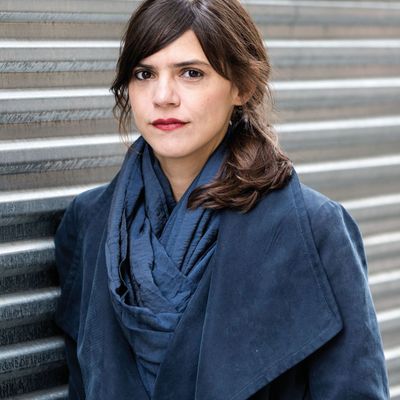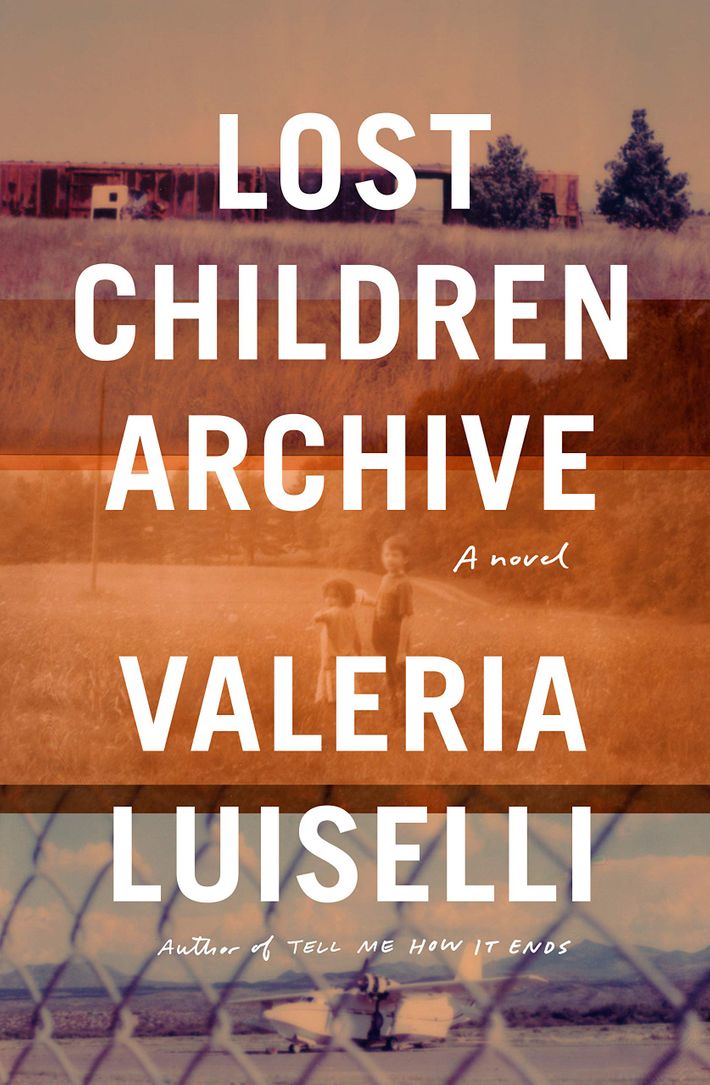
In 1212, in the midst of a religious fervor overtaking Europe, a group of children banded together and started marching east. As they moved through France and then Germany, their numbers grew into the thousands. These children — and they were all children — had one destination: Jerusalem, to capture it from Muslim forces. What became known as the Children’s Crusade ended, predictably, in disaster: Most children were never heard from again. In all likelihood, they were killed, kidnapped, sold into slavery, or just died along the way. But no one knows for sure.
Mexican author Valeria Luiselli’s newest novel, Lost Children Archive (out from Knopf this week), is concerned with the disappeared of another tumultuous era: our own. Her first English-language work of fiction is crisscrossed with the stories of children lost in the gaping desert of the American southwest — or perhaps lost before then, falling off the bucking back of la Bestia, the train carrying children to the border. They wear dresses with their mothers’ phone numbers sewn into the collar, carry small dusty backpacks holding an extra sweater, perhaps an extra pair of shoes, Ziploc bags filled with toothbrushes, and little tubes of toothpaste.
Luiselli, 35, has been thinking about these children for quite some time. In 2017, she published Tell Me How It Ends: An Essay in Forty Questions, a searing true account of the unaccompanied Central American children stuck in America’s Kafkaesque asylum system. Framed around her time as a volunteer translator in New York City’s immigration court, the book becomes a meditation on who gets to participate in what she calls America’s “great theater of belonging.” Now she has spun those question together into a novel in which a family road trip is interwoven with a dizzying archive of texts and images. The specters of children, walking under an unforgiving sun, looking for safety, family, childhood, lost somewhere in the massive graveyard of the desert, haunt the story. Luiselli spoke by phone with Vulture about the inhumanity of our system, “linguistic transvestism,” and her utter disinterest in autofiction.
You’ve mentioned that you wrote Tell Me How It Ends while trying to write this, because your anger about the crisis was getting in the way of the novel.
Yeah, exactly. I was too involved. I was also wondering about the politics of fictionalizing immediate reality. I had always had a very clear stance about not writing what is on the news. I conceived of the novelist as a kind of parasite that feeds off the news and regurgitates it and doesn’t really push the conversation further. I think about it a little bit differently now. This novel does not simply represent or reproduce the crisis, but kind of moves around the possible ways of telling stories.
Why the story of unaccompanied children?
It’s a very old obsession. As a Mexican in the U.S., it’s impossible for that issue not to be in your deepest bones. It’s something that you grow up with. I had friends who migrated when I was younger, and I remember all these letters from a friend in L.A. whose father had migrated and was undocumented. She was old enough to understand the really violent politics that affected them directly, and she would write to me about it in letters.
All the pieces of Lost Children Archive are in constant conversation with each other. The split narratives, the lists, the photographs, the maps … it’s a palimpsest.
That’s quite right. I guess everything is an echo of another thing. It’s not necessarily clear who emits the original sound. It’s like an echoing where the original source is lost. I like the kind of fiction that is often self-conscious about its artifice. That doesn’t mean that I conceive of my work as autofiction. I’m not at all interested in the discourse of that — like, is it about your life or not? Who the fuck cares? That does not add anything to the conversation. I’m talking about a kind of fiction that is porous, that documents, but also observes itself. I take notes for a very long time before I have enough material, so that’s just my process, and I guess that process leaves a footprint. I am happy to have messy footprints everywhere.
The book also made me think of how we speak of these unaccompanied children in really abstract, generalized terms.
Definitely. The media doesn’t always do stories a favor in the way that they tell them. It’s usually about these “masses” …
Yeah, there’s a bit in the book where two people are talking about “masses” of “alien kids.”
You don’t have to go to the most conservative newspapers to find that kind of language. It’s “illegal aliens,” “illegal children,” “wave,” “surge,” … I mean that’s how the story is told. I don’t know what has to happen for that to change. I suppose that maybe, in the best-case scenario, 40 years from now, we will read these news stories from today and say, “How the fuck was that possible? How come people didn’t complain that they were talked about that way?” This violence is normalized through language.
Lost Children Archive is concerned with the question of narrative order. In Tell Me How It Ends, the children’s stories are so traumatic that there’s often a breakdown of narrative order. Are there spaces where it’s impossible to impose order?
It’s a complex question. I guess the first time that I had to think about testimony was when I worked in court translating, where the only thing that was important was that the story be arranged in a way that would ensure that the person telling [it] would receive help from a lawyer. So it was a means to an end. But now, for the past four months or so, I’ve been teaching creative writing in a detention center with kids, and it’s very different. I cannot ask them to tell their stories, because if they have already given a testimony at the border and there’s any minimal change in my workshop, that could affect them. They wouldn’t be considered trustworthy.
It’s the particular violence of institutions — or more than that, of language owned by an institution. In some really fucked-up way, that institution owns that narrative. What you produce in confinement is not your own. And it can be used against you. So language can also become a weapon against you.
Do you feel that you sometimes have to take on this mantle of moving past certain stereotypes of Latin American literature?
Yes, I feel that. I think [Roberto] Bolaño had a lot to do with providing a kind of bridge toward some kind of more contemporary literature. It was through Bolaño I think that people started understanding that Oh, magic realism finished years ago! [Laughs.] But there’s still a huge gap between the last novels of the Boom and then Bolaño’s novels. My generation is being translated a lot more, but there’s an entire generation behind us that’s been forgotten.
This is your first novel written in English; the rest were in Spanish. You were born in Mexico and grew up in South Africa and India, among other places. You’ve spoken about not feeling at home in either language, and referred to“linguistic transvestism” in your writing. Has that become an identity in itself for you?
I think so — travestismo, and this chameleon-ness that you learn by having to find a sense of belonging in different spaces. There are certainly identity shifts, not so much from language to language but from community of belonging to community of belonging. English was the language of instruction for me, but I felt that [Spanish] could be more of a playground. At the same time, I moved very hesitantly in Spanish, because I didn’t grow up in countries where Spanish was the language of the street. So I guess there are insecurities in both languages. If you are bilingual, there’s this self-consciousness of misuse, or of inadequacy, or even of, like, not enough-ness in one language. And there’s the style that ensues from standing in a place that is never completely inside or outside. It’s the quality of observation, the tentativeness of things, the kind of insecure way of proceeding.
In Tell Me How It Ends, you write about this desire to “play a part in the greater theater of belonging” — the founding myth of the U.S. Do you believe in the concept, or do you think we should fight against it?
I think all of those things at once. I can’t help but be a little cynical about what it takes to belong. But then again, one stays in a place for a reason, right? What is often very frustrating to see is that the people that flee to the U.S. will do everything it takes to be able to stay. But the circumstances in which they will stay are inhumane. The Trump administration has really exacerbated the inhumanities of the Obama administration and the prison-industrial complex. There are more and more people detained, and for much longer amounts of time. Why? Because it’s profitable. Because every undocumented body produces at least $200 a day, and you know what? An undocumented minor produces usually double that of an adult. So it’s a huge business and there are a lot of corporations that are making a lot of money out of this. And the brutality of what I’m saying is that sometimes, that is better than the not coming. Even though coming means being incarcerated.
This interview has been edited and condensed.


